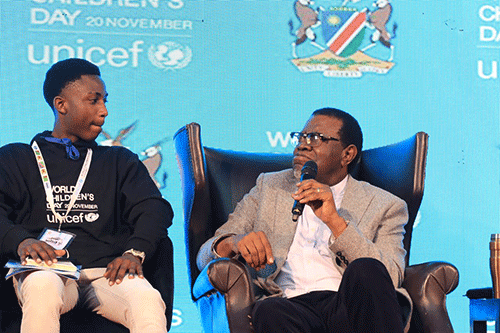WALVIS BAY – Children from Namibia, Zimbabwe, Zambia and Botswana have called upon their presidents for an updated curriculum, inclusive education and better protection against domestic and sexual abuse as well as cyberbullying.
Children from the four countries made the call during constructive discussions, held with presidents Hage Geingob and Mokgweetsi Masisi (Botswana), Kembo Mohadi (vice president of Zimbabwe) and Doreen Mwamba (minister of community development of Zambia) as part of World Children’s Day commemorations at Walvis Bay on Sunday.
The youngsters said they desire inclusive education, while protection against domestic and sexual abuse, and the need for an updated and responsive educational curriculum were highlighted during the discussions.
The children observed that significant progress has been made, but many around the world continue to be victims of human trafficking, as well as sexual and domestic abuse, while many lost their lives in war-torn countries.
They also highlighted inequality in education, problems with access to education and poverty.
Moreover, they said children with disabilities are still left behind when it comes to inclusive education and employment.
Speaking on behalf of the Namibian children, Allen Petrus pointed out that inclusive education needs urgent attention, as children with disabilities face long-term barriers, limiting their day-to-day functions.
“For example, we can look at physical barriers… the education system has four main goals, but equal and quality education is key. Unemployment is one of the leading factors among the youth – not only in Namibia but worldwide. Among these unemployed youth, disabled people are also included. So, I would like to know what our leaders have done or what plans they have to ensure that disabled youth are included in job opportunities?” he questioned.
They also want all children with disabilities to be able to finish their primary schooling, secondary schooling as well as their tertiary level of education, and become leaders in the
world.
Petrus then praised the Namibian government for the decision last year to increase the grant for orphans, vulnerable children and children with disabilities from N$350 to N$1 400.
“This is really commendable, and it shows that government is serious about enhancing the living conditions of disabled people. This is how we can support children with disabilities to maximise their potential without discrimination and stigmatisation,” he continued.
Responding to Petrus, President Geingob said Namibia continues to strive to be an inclusive country that does not discriminate; hence, the country invested in making Namibian buildings user-friendly for disabled persons.
“Yes, disability is not about abilities or disabilities. However, we are recognising that disabled individuals may need special skills and assistance through education. Government is committed to the advancement of inclusive education, and it is reflected in our budget, where social safety nets, such as social grants, are a priority,” he stated.
Geingob reiterated that while disability is not inability, it must be recognised that there are certain needs for them due to their different bodies.
Around 400 children from the four countries came together to commemorate the day, and shine a light on the rights of children.
World Children’s Day is hosted by the United Nations International Children’s Emergency Fund (Unicef), and this year’s celebrations were held under the theme, ‘Renewing Our Promise for Children’s Rights’.
Unicef was established in 1946 in the aftermath of World War II to help children and young people, whose lives and futures were at risk.
– edeklerk@nepc.com.na


